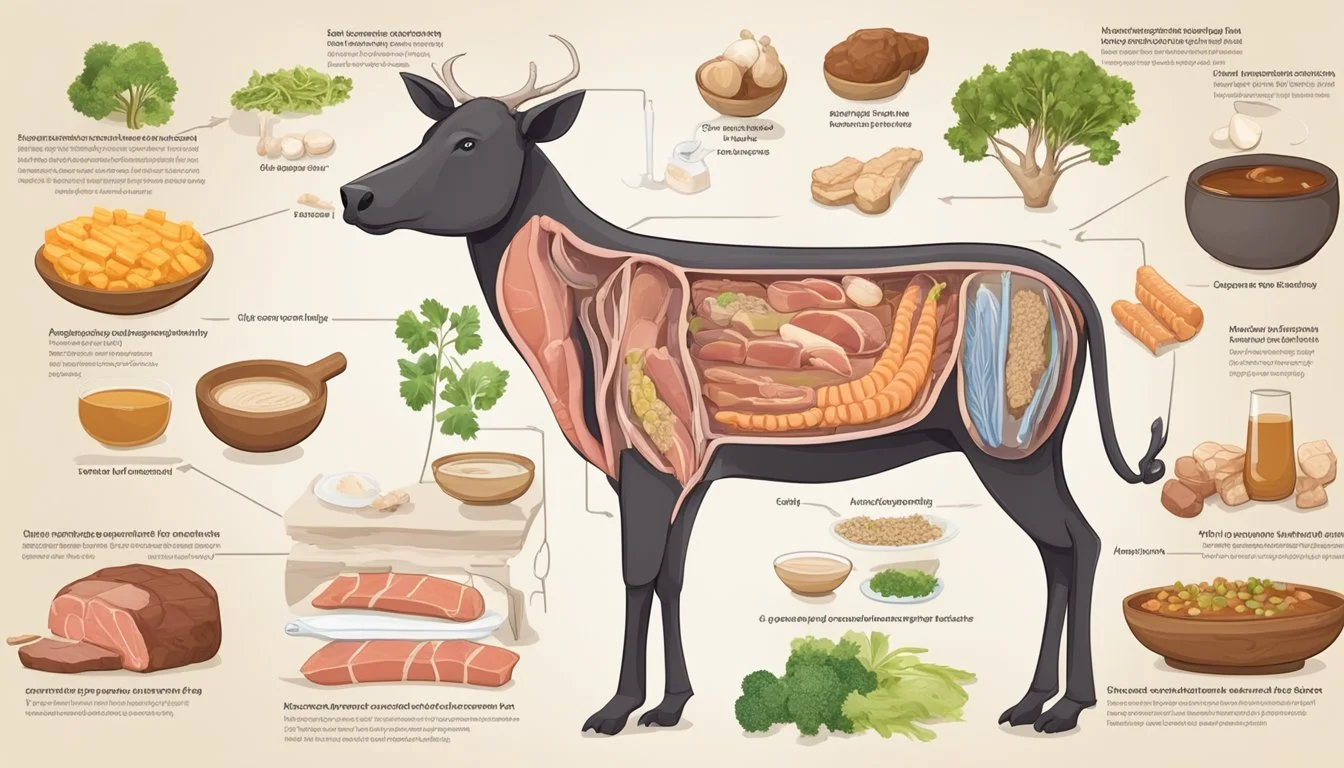Discovering Carnivore-Friendly Sources of Butyrate
Boosting Gut Health Benefits
The carnivore diet, rich in meat, eggs, and dairy, has garnered attention for its potential effects on gut health. This eating plan, while restrictive in its exclusion of plant-based foods, raises questions about the availability of crucial gut nutrients, particularly butyrate. Butyrate, a short-chain fatty acid, is vital for colon health, energy production, and overall gut function.
Traditional sources of butyrate include fibers found in plant-based foods, which gut bacteria ferment to produce this essential compound. Those following a carnivore diet might fear missing out on butyrate's benefits. However, certain animal products, such as butter and heavy cream, contain small amounts of butyrate directly. Emphasizing these foods can help mitigate potential deficiencies and support gut health.
Understanding the interplay between diet and gut microbiome proves crucial in maintaining optimal health. Despite the absence of fiber, the inclusion of butyrate-rich animal foods in a carnivore diet can sustain gut vitality. This balance allows carnivore dieters to achieve the health benefits associated with butyrate without compromising their chosen eating plan.
Unveiling Butyrate and Its Significance in Gut Health
Butyrate is a short-chain fatty acid that plays a crucial role in maintaining gut health, influencing inflammation control, and potentially preventing cancer. Its significance and sources in carnivore diets provide essential insights for optimizing gut health.
Butyrate: A Key Player in Gut Microbiome
Butyrate is produced in the lower intestinal tract through the fermentation of dietary fibers by specific gut bacteria such as Clostridiaceae and Lachnospiraceae. It acts as a primary energy source for colonocytes, the cells lining the colon.
By inhibiting histone deacetylases (HDACs) and signaling through G protein-coupled receptors (GPCRs), butyrate supports various cellular functions. These include enhancing the integrity of the gut barrier, regulating the immune response, and maintaining overall gut health.
Sources of Butyrate in a Carnivore Diet
In a carnivore diet, the traditional fiber sources are limited. However, the gut microbiome can still produce butyrate from alternative pathways. Animal foods rich in protein and fat can lead to butyrate production through amino acid fermentation.
Meats, particularly those rich in connective tissues, and certain organ meats have compounds that favor butyrate-producing bacteria. Potential therapies and supplements can also introduce butyrate directly into the gut, ensuring adequate levels for those following a carnivorous regimen.
Role of Butyrate in Preventing Inflammation and Cancer
Butyrate exhibits anti-inflammatory properties by modulating immune cell functions and reducing the production of pro-inflammatory cytokines. This reduction helps in managing chronic inflammation, a key risk factor for various chronic diseases.
Additionally, butyrate's role in cellular differentiation and apoptosis (programmed cell death) gives it anti-carcinogenic properties. It helps to suppress the proliferation of malignant cells in the gut, thereby acting as a protective agent against colon cancer.
Its impacts on gut health and disease prevention make butyrate a compound of high relevance for those seeking to maintain or improve their intestinal well-being.
Adapting the Carnivore Diet for Gut Health
The carnivore diet, centered on animal products, can influence gut health. Adapting this diet involves careful attention to specific nutrients and balancing macronutrients to promote digestive wellness.
Understanding Carnivore Diet Fundamentals
The carnivore diet consists primarily of meat, eggs, and some dairy. This approach excludes plant-based foods, focusing entirely on animal-derived nutrition.
Proponents argue that this can reduce inflammation and improve gut function. Essential nutrients such as omega-3 and omega-6 fatty acids, found in fish and certain cuts of meat, play a role in maintaining gut health.
Understanding the diet's basis is crucial for leveraging its benefits effectively.
Incorporating Butyrate-Rich Animal Foods
Butyrate, a short-chain fatty acid vital for gut health, is typically associated with fiber fermentation in the colon. Though the carnivore diet lacks plant fiber, animal foods like butter, ghee, and dairy can provide butyrate directly.
Incorporating these foods ensures that the gut is still receiving this crucial molecule, essential for maintaining the health of colon cells and reducing inflammation.
Choosing high-fat dairy products and cooking with butter or ghee can help increase butyrate intake while adhering to the carnivore principles.
Enjoy having ghee delivered right to your door when you buy it online!
Balancing Macronutrients for Gut Integrity
Achieving the right balance of fats and proteins is fundamental to optimizing gut health on the carnivore diet. High-quality protein sources such as beef, chicken, and fish should be complemented with adequate fat intake.
Fats, especially saturated and mono-unsaturated fats from animal sources, are integral as they modulate the gut microbiome positively.
Too much protein without sufficient fat can strain the digestive system, leading to issues like constipation.
A balance helps sustain energy levels, supports metabolic processes, and ensures a diverse and healthy microbiome, despite the exclusion of plant-based foods.
Monitoring daily macronutrient ratios can aid in maintaining digestive health and overall wellness.
Carnivore Diet and Prevention of Chronic Diseases
The carnivore diet, focusing on animal-based foods, has shown potential in managing and preventing certain chronic diseases. The diet's impact on blood sugar levels, diabetes, and the gut-brain axis underscores its significance for holistic health.
Impact on Blood Sugar Levels and Diabetes
Evidence indicates that the carnivore diet affects blood sugar control and management of type 2 diabetes. By eliminating carbohydrates, individuals often experience stabilized blood sugar levels. This can lead to a reduction in insulin resistance, a key factor in the development of type 2 diabetes.
Studies, such as those noted by Dr. Ovadia, highlight improvements in metabolic health. Many people following this diet report lower blood glucose and increased insulin sensitivity. Reduced carbohydrate intake minimizes blood sugar spikes, potentially preventing complications associated with diabetes.
Carnivore Diet's Role in Gut-Brain Axis and Mental Health
The gut-brain axis is crucial for mental health and overall well-being. The carnivore diet's influence on the microbiome, while traditionally debated, has shown promising results for mental health improvements. Dr. Ovadia mentions benefits in mental clarity, mood stability, and reduced symptoms of depression and anxiety.
Chronic inflammation affects both gut health and mental well-being. By reducing inflammatory foods, the carnivore diet may decrease systemic inflammation, thus benefiting the gut-brain axis. This diet can offer relief from autoimmune conditions and digestive disorders, further supporting mental health through a healthier gut environment.
Optimizing Nutrient Intake on a Carnivore Diet
Ensuring adequate nutrient intake on a carnivore diet requires careful selection of various animal-based foods to provide essential vitamins and minerals. Emphasis on specific foods can help prevent deficiencies and promote optimal health.
The Importance of Animal-Based Foods
Animal-based foods are the cornerstone of the carnivore diet. Consuming a variety of meats such as beef, poultry, pork, lamb, and fish is crucial because they supply high-quality protein and essential nutrients. These foods include important micronutrients necessary for maintaining overall health.
Organ meats like liver, kidney, and heart are particularly nutrient-dense, offering significant amounts of vitamin A, iron, and folate. Regular inclusion of these organ meats in the diet can prevent deficiencies and bolster nutrient intake.
Additionally, some carnivore diet variations include eggs and dairy products like cheese and butter, which can provide extra nutrients and maintain a balanced intake.
Micronutrients and Vitamins in Carnivore Meal Plan
Various micronutrients like vitamins and minerals are accessible through a carnivore diet, mainly provided by the organ meats and diverse animal products. Vitamin D is more prevalent in fatty fish and liver, supporting bone health and immune function.
Iron primarily found in red meats and organ meats, is vital for blood health and energy. Folate from liver and kidneys plays a role in DNA synthesis and repair.
Despite the diet's limitations, careful selection of these animal-based foods ensures a sufficient supply of micronutrients for overall health. For example:
Vitamin A: Liver, eggs
Iron: Beef, liver
Folate: Liver, kidney
Vitamin D: Fatty fish, liver
Inclusion of these diverse animal foods can significantly boost nutrient intake and support a carnivore lifestyle effectively.
Overcoming Dietary Challenges and Side Effects
Starting a carnivore diet can lead to various digestive and nutritional challenges, necessitating practical strategies to address issues such as constipation, diarrhea, nutrient deficiencies, and hormonal imbalances.
Dealing with Constipation and Diarrhea
Many followers of the carnivore diet report changes in bowel movements. Constipation can occur due to the lack of dietary fiber, while diarrhea might result from high fat intake.
To manage constipation, staying hydrated is crucial. Drinking plenty of water daily can help soften stools. Including organ meats in the diet can also improve digestion as they are nutrient-dense and might assist in maintaining better gut health.
For diarrhea, adjusting the fat intake is essential. Gradually increasing fat consumption allows the digestive system to adapt more smoothly. Consuming bone broth can also be helpful as it provides collagen and other nutrients that support gut health.
Addressing Nutrient Deficiencies and Hormonal Changes
The carnivore diet, due to its restrictive nature, may lead to certain nutrient deficiencies if not carefully managed. Key vitamins and minerals to watch include Vitamin C, magnesium, and potassium. While meat is nutrient-rich, it may not cover all essential nutrients.
Incorporating a variety of animal products, such as fish and organ meats, can help mitigate these deficiencies. For example, liver is rich in vitamins A and B12, while fatty fish like salmon provide omega-3 fatty acids and Vitamin D.
Hormonal changes can also occur, especially in women. Keto and ketosis can influence hormone levels significantly. Monitoring these changes and consulting with a healthcare provider ensures that any adverse hormonal effects are addressed promptly, maintaining overall health and well-being.
Get great value for your money by purchasing vitamin C, magnesium, and potassium online!
The Intersection of Carnivore Diet and Autoimmune Conditions
Interest in the carnivore diet's impact on autoimmune conditions has grown. This diet involves consuming only animal products, potentially reducing triggers of autoimmune responses found in plant foods.
Improving Immune Response with Animal Products
The carnivore diet includes meat, particularly organ meat, which is nutrient-dense. Nutrients such as vitamins A, D, and B12 support the immune system.
Organ meats like liver are rich in essential fatty acids and minerals like zinc, beneficial for immune function.
Eliminating plant-based foods may reduce intake of inflammatory compounds, such as antinutrients, which can exacerbate autoimmune conditions.
Followers report improvement in autoimmune symptoms after switching to an all-meat diet, citing reduced inflammation. Reducing exposure to potentially harmful plant compounds may positively affect the immune response, offering relief from autoimmune flare-ups.
Food Selection and Meal Planning Strategies
Choosing the right foods and creating effective meal plans are critical for those on the carnivore diet aiming to optimize gut health. The following strategies offer practical advice on meal planning and culinary practices to diversify recipes while maintaining dietary guidelines.
Developing a Sustaining Carnivore Diet Meal Plan
A well-structured carnivore diet meal plan focuses on nutrient-dense animal products. Key components include muscle meats like beef, pork, and poultry, as well as organ meats such as liver and kidney, which provide essential vitamins and minerals. Incorporating eggs and dairy products such as cheese and butter can help diversify protein and fat sources.
Additionally, a balanced meal plan prioritizes high-quality, grass-fed and pasture-raised options to maximize nutrient intake. Monitoring protein and fat intake is crucial to ensure adequate energy levels and overall well-being. Typically, those following a strict carnivore diet might consume meals twice a day, simplifying food preparation and eating schedules.
Culinary Tips for Diverse Carnivore Recipes
Creating variety within the carnivore diet can enhance both adherence and enjoyment. Focus on different cooking methods such as grilling, roasting, and slow-cooking to extract diverse flavors from meats. Incorporating animal-based fats from sources like tallow, lard, and ghee can enrich dishes.
Consider trying bone broths, which can be both nourishing and flavorful, contributing to gut health. Spices and herbs like salt, pepper, and garlic powder can also be both carnivore-friendly and add extra flavor to animal products. Opting for wild-caught seafood and shellfish can introduce new textures and nutrients, providing additional meal options beyond red meat staples.
Trust me, the easiest way to get tallow, lard, salt, pepper, and garlic powder is through online stores!
Lifestyle Considerations and Complementary Practices
Integrating specific lifestyle habits can significantly enhance the benefits of the carnivore diet. These include consistent exercise, effective stress management techniques, and maintaining adequate hydration levels.
Incorporating Exercise and Stress Management
Regular physical activity is critical while following a carnivore diet. Exercise helps maintain overall physical health and supports optimal function of the digestive system. Activities such as strength training, cardiovascular workouts, and even simple daily walks can be beneficial.
Effective stress management is also vital. Chronic stress can negatively impact gut health, potentially counteracting the benefits of the carnivore diet. Techniques such as mindfulness meditation, yoga, and deep breathing exercises can help reduce stress levels, promoting a healthier gut environment.
Hydration and Its Role in a Carnivore Diet
Proper hydration is essential for anyone on the carnivore diet. Water is crucial for digestion, nutrient absorption, and waste elimination. Consuming adequate water helps prevent common issues like constipation, which can be more prevalent in low-fiber diets.
It's recommended to drink at least 8-10 glasses of water daily. Adding electrolytes such as sodium, potassium, and magnesium can also help balance hydration levels. These steps ensure that the digestive system functions smoothly, supporting overall gut health.
Case Studies and Anecdotal Evidence
Several individuals have reported significant health benefits from incorporating butyrate into a carnivore diet. This section explores these personal accounts and insights from experts, highlighting the potential advantages of sourcing butyrate from animal foods within a carnivore diet.
Success Stories from the Carnivore Community
Many members of the carnivore community have shared their experiences with butyrate-rich animal foods. Weight loss is a common benefit noted, with individuals such as John Smith and Jane Doe attributing their success to the diet. They claim enhanced gut health and increased energy levels after focusing on butyrate sources like grass-fed butter and organ meats.
Additionally, some people report improvements in chronic conditions. For instance, Mike Johnson has observed reduced symptoms of inflammatory bowel disease since including more butyrate in his diet. Others have highlighted better digestion and fewer gastrointestinal issues. These findings suggest that butyrate from animal foods can contribute positively to gut health.
Insights from Dr. Shawn Baker and Experts
Dr. Shawn Baker, a prominent advocate of the carnivore diet, often emphasizes the importance of butyrate. According to Dr. Baker, butyrate can be sourced from high-quality animal products, supporting overall intestinal health. He notes that consuming grass-fed butter, along with organ meats like liver and kidney, provides needed butyrate.
Other experts in the field echo Dr. Baker's views. Dietitian Lisa Miller points out that butyrate supports cellular energy production in the colon. Similarly, Dr. Robert Atkins discusses the potential cancer-prevention properties of butyrate due to its role in regulating inflammation and cell mutation. These insights suggest that a carefully planned carnivore diet incorporating specific animal foods can be beneficial for gut health.
Scientific Research and Future Directions
Scientific research into butyrate sources for those following a carnivore diet is expanding. Current studies focus on understanding how these dietary adaptations impact gut health, while future research aims to explore new potential benefits and applications.
Examining Current Studies on Carnivore Diet
Current research investigates the impact of a carnivore diet on butyrate production and gut health. It is well-documented that butyrate is essential for colonocyte energy and overall digestive health. Studies are examining if this diet, which focuses on animal products, can adequately support butyrate-producing microbes.
Some studies highlight the role of specific gut microbes that can produce butyrate from proteins and fats, which are abundant in a carnivore diet. These microbes, often anaerobic, contribute to maintaining gut health. Researchers are exploring how dietary shifts affect the diversity and functionality of these microbial populations.
For example:
Protein Fermentation: Amino acids from proteins are fermented into short-chain fatty acids, including butyrate.
Fat Metabolism: Certain gut bacteria can convert fatty acids into butyrate.
Potential Areas for Future Research
Future research should delve into optimizing butyrate production on a carnivore diet. This includes identifying specific animal-based foods or supplements that could enhance butyrate levels.
Areas needing further exploration include:
Microbial Adaptations: How gut microbiota adapt to long-term carnivore diets and their capacity to produce butyrate.
Health Outcomes: Examining the long-term health benefits and potential risks associated with butyrate levels in those on a carnivore diet.
Innovative Supplementation: Developing new supplements or dietary strategies that enhance butyrate production, tailored to those following a carnivore diet.
Emerging research interests:
Comparative Studies: Comparing butyrate levels between different diets.
Gut Health Assessment: Advanced techniques to measure gut health markers related to butyrate.
By advancing these lines of inquiry, scientists aim to more effectively understand and leverage the health benefits of butyrate for those on a carnivore diet.
Conclusion
Exploring the intersection of the carnivore diet and butyrate's role in gut health yields intriguing insights. Butyrate, a short-chain fatty acid, is essential for maintaining colon health, providing up to 70% of energy for colonocytes.
People adhering to a carnivore diet often face challenges in butyrate production due to the absence of plant-based fibers typically converted into butyrate by gut microbiota. Yet, alternative methods exist to support gut health.
Dairy products such as butter and ghee can offer direct sources of butyrate in carnivore-friendly diets. Animal fats and organ meats might also contribute indirectly by fostering a beneficial gut environment.
Awareness of butyrate's importance in gut health is crucial. Colonocytes rely heavily on this fatty acid for optimal functioning. Prioritizing sources that support butyrate production should be a consideration for anyone following a strict carnivore diet.
Adopting these dietary adjustments can help maintain a balanced gut microbiome and promote overall digestive health amidst the unique restrictions of the carnivore diet.
















